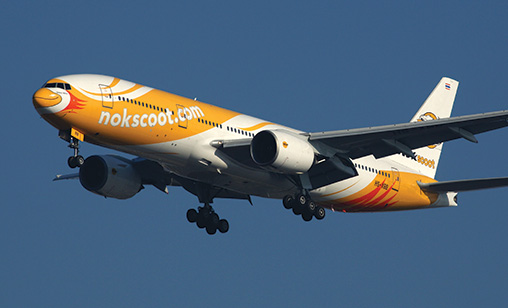News
NokScoot building North Asia network with SIA’s 777-200s
NokScoot will aggressively develop a North Asia network while keeping costs down, CEO Yodchai Sudhidhanakul told Orient Aviation last month.
April 1st 2019
Medium haul low-cost carrier, NokScoot, will revive its North Asia expansion strategy with the arrival in the second half of this year of seven ex-Singapore Airlines B777-200s. Read More » Operating the aircraft cost efficiently will be a challenge, said the LCC’s CEO, Yodhai Sudhidhanakul. They are “fairly aged” but he hoped that more fuel burn costs could be offset by higher seat density on the routes planned for the 777s.
At present, NokScoot operates five 777s, configured with 24 Scootbiz seats and 391 economy seats, out of the LCC’s home base at Bangkok’s Don Mueang airport. Sudhidhanakul, who was chief commercial officer of the LCC before taking on the top job, said: “obviously it gets better the more aircraft you have, the more economy of scale kicks in. It will have benefits”.
 |
This is good news for NokScoot because it had a bad 2018. Revenues rose 4.45% to 5,828 million baht (US$183.9 million) off the back of 1.16 million passengers. However, operating revenues increased by a much sharper 30.61% to 7,388 million baht .The net loss of 1,528 million baht was up dramatically on the previous year’s 47.59 million baht (USD1.5 million) deficit.
NokScoot has applied to increase flights to Osaka, which it already services 19 times a week, and to expand its Tokyo-Narita frequency from four times daily. It also intends to open Bangkok-Hokkaido, initially as a charter, and then build it to a daily route depending on demand.
“The next one is going to be Incheon. It depends on the [U.S.] Federal Aviation Administration (FAA),” Sudhidhanakul said. “Provisionally, the plan is for that service to open within this year. But we have had that expectation four years.”
Japan and Korea are not so much new markets for NokScoot but a return to the original game plan of the airline when it was set up in 2014. The LCC’s growth has been steady rather than spectacular since it flew its first international flight, to Singapore, in May 2015. Last December it opened Bangkok Delhi and in March it launched to Shanghai.
Establishing Korea and Japan as the linchpins of its network strategy halted when the FAA raised concerns about safety at Thai carriers and a red flag was issued against Thailand. “So we shifted to China,” Sudhidhanakul said. NokScoot serves six Mainland cities: Shanghai (daily), Nanjing and Qingdao 14 times a week, Shenyang 10 a week, Tianjin daily and Xian six a week.
China remains fundamental to the LCC’s growth with Chengdu, Kunming and Beijing on its radar. “It’s fairly simple. You have to ask if there’s demand for that particular city and whether you will be able to make it,” Sudhidhanakul said. “And whether you get the traffic rights or the slots, but there are some external factors that are outside your control.”
“There are always sustained challenges for airlines that are not specific to NokScoot,” he said. They include the problems of all carriers – fuel costs, currency fluctuations, government regulatory constraints and infrastructure limitations.
He readily conceded the reputational issues, among them delays, poor standards and ownership tussles, that the LCC’s Thai parent and 49% investor, Nok Air, has. “Nok still has problems, but Chinese companies and consumers do not do deep internet research about these issues,” he said, but added Nok’s reputation “might have some impact B2B”.
His LCC has a unique proposition, Sudhidhanakul said, in that it combines Singaporean standards of safety, security and quality and the more intuitive hospitability of Thais.
“To me this is the most desirable combination,” he said. Improvements at the LCC should make the airline more efficient but at the same time not robotic. “I am looking at the people that are working in the company to be on a journey,” he said.
“I am trying to teach them. They should come here, learn, develop and move. My idea is to accept that fact. I believe that I should let staff go even if they are good. They should move on. Its a stage in life.”
At press time, NokScoot and SIA Engineering Company announced a line maintenance joint venture based at Don Mueang airport that will be expanded to other key airports in Thailand. “The US$2 million investment is a significant milestone for us at NokScoot. It will help us provide faster and more reliable line maintenance services to support our growth plan,” Sudhidhanakul said.
NokScoot’s 49% shareholder, Tigerair Scoot, is a wholly owned subsidiary of Budget Aviation Holdings. Budget Aviation, in turn, is 100% held by Singapore Airlines.